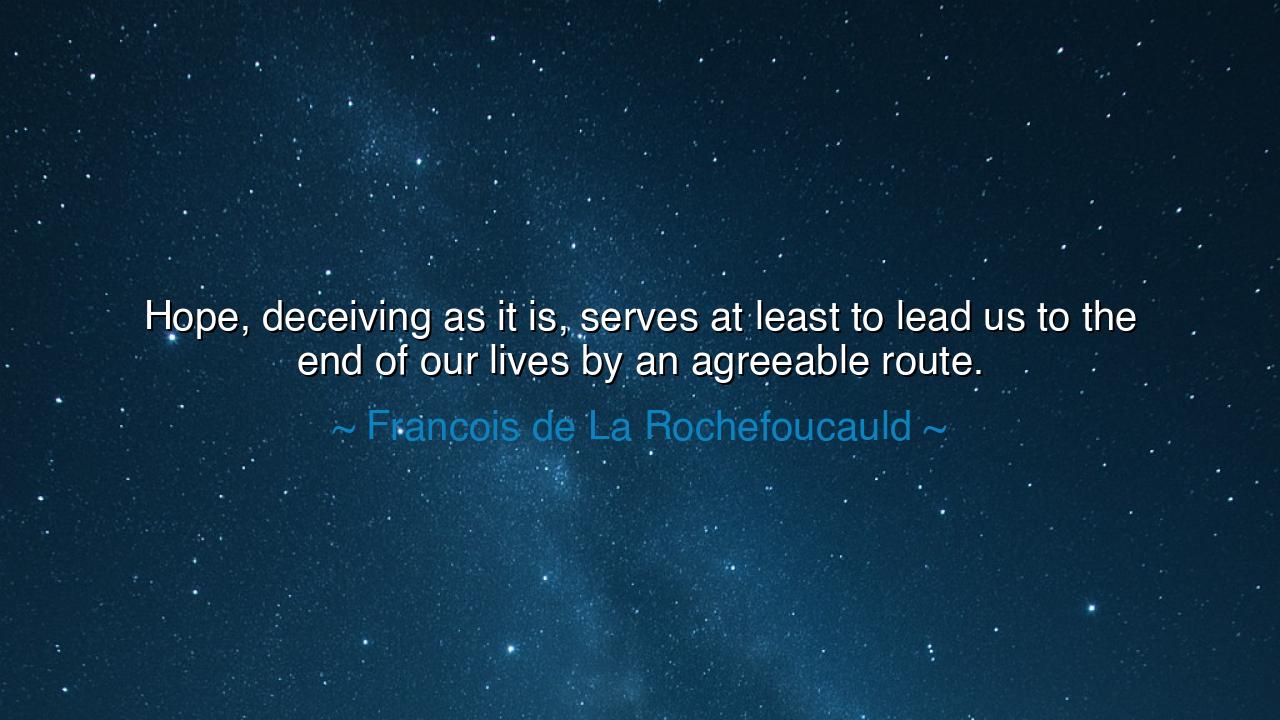
Hope, deceiving as it is, serves at least to lead us to the end
Hope, deceiving as it is, serves at least to lead us to the end of our lives by an agreeable route.






"Hope, deceiving as it is, serves at least to lead us to the end of our lives by an agreeable route." Thus wrote François de La Rochefoucauld, the French nobleman and moralist whose pen pierced through the illusions of the human heart. In this elegant confession, he lays bare one of the most paradoxical truths of existence: that hope, though often a deception, is also a necessity—the gentle lie that gives meaning to our days, the flickering light that carries us forward even when reason would bid us stop. His words are not the scorn of a cynic, but the sigh of a man who has lived, suffered, and seen the world for what it is: a place where truth and illusion intertwine, and where even false comfort may be a mercy.
La Rochefoucauld lived in the glittering yet treacherous court of seventeenth-century France, amid intrigue, betrayal, and shifting fortune. There, he observed that men and women are guided less by wisdom than by vanity, ambition, and self-deception. Yet even he, whose insights were sharp as a blade, acknowledged that hope, though a deceiver, performs a sacred duty—it softens the harshness of life, allowing us to endure what would otherwise be unbearable. To live without hope, he knew, is to stare into the abyss unblinking; to live with it, however fragile, is to walk toward death by an agreeable route—with grace, with dreams, with the illusion that tomorrow might yet be kinder.
Indeed, the ancients themselves knew this double nature of hope. In the Greek myth of Pandora, when all the evils of the world escaped from the jar—disease, despair, envy—only one spirit remained within: Elpis, the spirit of hope. Some say this was mankind’s consolation, others its final delusion. Was hope a blessing, meant to comfort the wounded soul, or a curse, meant to prolong its struggle? La Rochefoucauld’s words seem to embrace both views. Hope, he admits, may not deliver us from our fate—it may even mislead us—but it gives us something beautiful to hold as we journey through uncertainty. The wise man does not despise this illusion; he simply understands its limits and cherishes its sweetness while it lasts.
Consider the life of Ernest Shackleton, the explorer who led his men into the frozen desolation of Antarctica. When their ship, Endurance, was crushed by ice, they were stranded on a white, merciless sea. Food dwindled, frostbitten fingers failed, and despair hovered like a vulture. Yet Shackleton, knowing the power of hope, kept his men alive not through reason, but through belief. He told them they would survive, even when every sign said otherwise. They sang, they laughed, they dreamed of home. The hope that deceived them also sustained them—and in time, it became truth. Shackleton brought them all back alive. Thus, we see that even the illusion of hope can summon courage where reason finds none.
La Rochefoucauld’s insight also reminds us of the fragility of the human heart. For we are creatures of longing, ever reaching toward what we cannot grasp. Without hope, we would wither; with too much, we risk heartbreak. The art of living lies in this balance—to walk with hope as one walks with a beautiful but fickle companion, aware that she may betray us, yet grateful for the comfort she brings. To reject her entirely is to live in darkness; to trust her blindly is to court despair. The wise soul accepts hope’s deceit not as failure, but as grace—a necessary dream that keeps the spirit from growing cold.
The lesson, then, is not to abandon hope, but to understand it. When life deceives you with its false promises, do not curse the light that guided you; for it was that same light that gave you strength to walk. Even the illusion of purpose can bring forth real courage, real kindness, real endurance. Let hope be your companion, but not your master. Let it inspire your action, but do not let it cloud your discernment. To live fully is to dream while awake—to see both the beauty and the deceit, and to love them both for what they are.
So, my listener, take these words as wisdom for your journey. The path of life is uncertain and often cruel; many of its promises will crumble before you. Yet, walk it still—with hope in your heart and awareness in your mind. Know that even if hope deceives, it still adorns the journey with meaning. The blossom may fade, but its fragrance remains. For in the end, as La Rochefoucauld teaches, it is better to be led to our end by a radiant illusion than to stumble through the shadows without any light at all.






AAdministratorAdministrator
Welcome, honored guests. Please leave a comment, we will respond soon